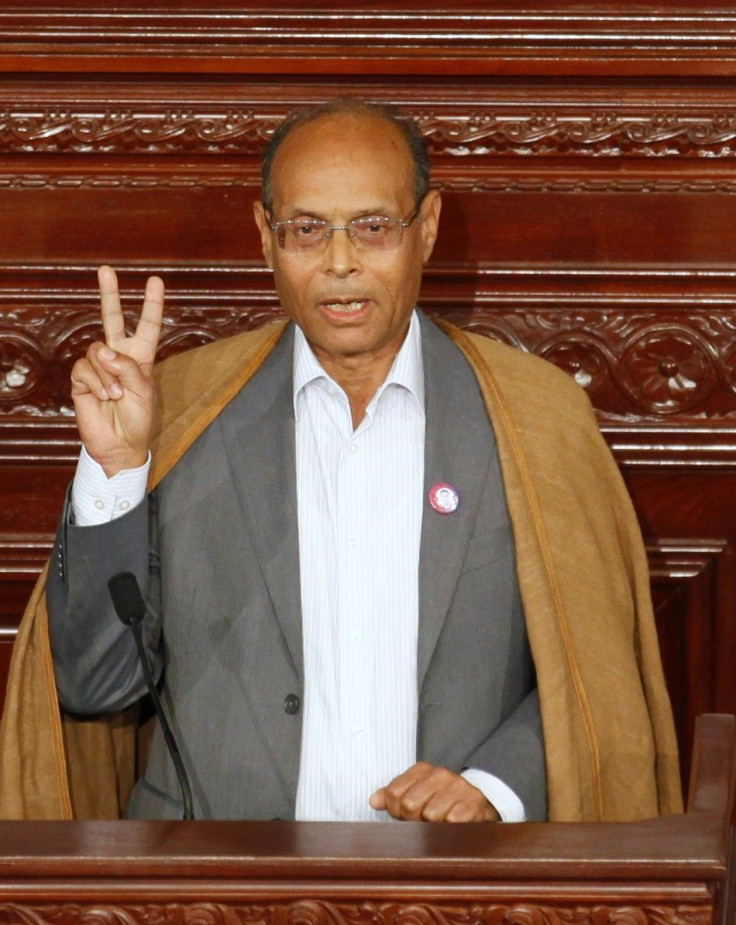Moncef Marzouki Named President; Tunisia Moves Forward

On Tuesday, Tunisia swore in center-leftist politician Moncef Marzouki as its new president.
Marzouki, once a political outcast, was elected 10 months after the fall of former President Zine El Abidine Ben Ali's government, following the first wave of Arab Spring protests.
“Tunisians have proved to the world that they are a civilized people who have the ability and resources to overcome all challenges,” he said, while acknowledging urgent work needs to be done to save the country's failing economy.
“The Arab world is watching the Tunisian experience and its success will be a model while its failure would have negative repercussions.”
Marzouki was elected by the Constituent Assembly, an elected body of representatives. The moderate Islamic party Ennahda holds a majority of the seats and reportedly elected Marzouki as part of a deal that would place an Ennahda member in the prime minister's seat. Members of the opposition handed in blank ballots in protest of Marzouki's selection.
It is the greatest honor that anyone could dream of being elected by two-thirds of the vote, Marzouki said after the election. I will exert all my efforts to be worthy of this trust.
The efforts of the different political parties will be joined in the coming period to fulfill the objectives of the revolution and lay the foundations of a democratic and civilian state where rights are respected and liberties guaranteed, especially women's liberty, Marzouki added during his inauguration at the presidential palace in Carthage.
I will be the guarantor of the national interests, the state of laws and institutions... I will be faithful to the martyrs and to the objectives of the revolution.
Who is Moncef Marzouki?
Marzouki is a founding member of the Congress for the Republic, a secular, left-leaning political party that was banned by Ben Ali's government in 2002, a year after its incorporation. As a result, Marzouki went into self-imposed exile in France, where he continued to run the party.
He finally returned to Tunisia in January, just four days after Ben Ali fled the country in disgrace. He was given a hero's welcome.
“I would really appreciate to be part of this new Tunisia, whether I’m president or not,” he said at the time. “This is not the problem. The problem is that for the first time I am proud to be Tunisian, I’m proud to be Arab.”
Despite the significance of an outcast social activist and former-enemy of the state coming to power, Marzouki will have few powers as president. In Tunisia's new political body, the president will be in charge of the government while the prime minister will lead the country. Marzouki will be in charge of selecting the prime minster, and he is expected to pick Hamadi Jebali, Ennahda's Secretary-General.
Many Tunisians have praised Marzouki and are excited to see what, after years of activism, he can achieve for Tunisia. Still, others are skeptical that about how much he will be able to accomplish with such limited influence.
With zero powers, do we expect our president, Marzouki, to eliminate corruption in Tunisia? Tunisian Amal Rebai told http://www.magharebia.com/cocoon/awi/xhtml1/en_GB/features/awi/features/2011/12/13/feature-02>Magharebia.
With zero powers, can he create jobs and achieve equitable development? He has zero powers. What reforms do we expect from a president without powers?
Tunisia's Future
While some critics are worried about a growing fundamentalist Islamic presence in Tunisia, and others fret over the divisions between the youth and the older generation of politicians, the future of Tunisia's new government cannot be predicted.
The country's new leaders are taking cautious, yet enthusiastic, steps toward democracy. Ennahda is reportedly working on a number of plans to jump-start the country's economy and to create jobs, and, contrary to some Western critics views of the party, do not have any non-secular measures on the agenda.
One of Tunisia's biggest hurdles is the drafting of a new constitution. The assembly was expected to already have a new constitution in place by the time a president was appointed, but there have been delays. On Saturday, a “mini-Constitution” was approved that contains procedural guidelines which will be in place until a full constitution is written and signed into law.
The future of Tunisia is uncertain, but it has significant potential. Like Marzouki said, “the Arab world is watching Tunisia as the possible model for democracy. Each Arab Spring country is unique and has its own challenges, but Tunisia might have the best shot at success.
As a small country geographically distant from Israel and with no oil or gas that Europe relies on, it won't take long to establish a sound democracy and set off on the road to economic development, Dr. Ayman Mustafa wrote for Gulf News on Tuesday.
© Copyright IBTimes 2025. All rights reserved.





















